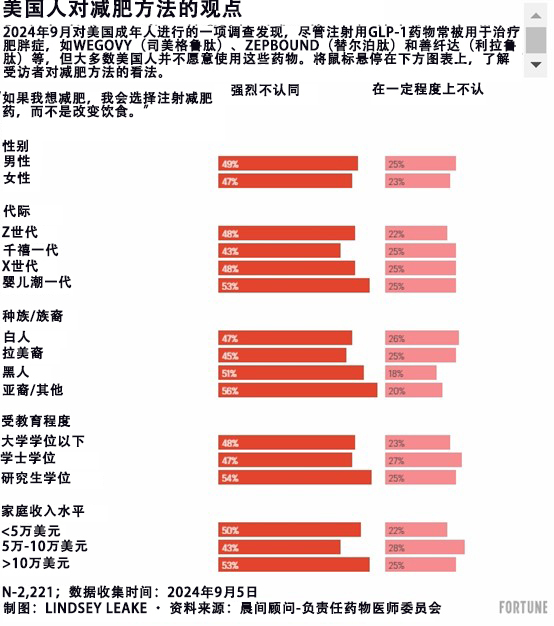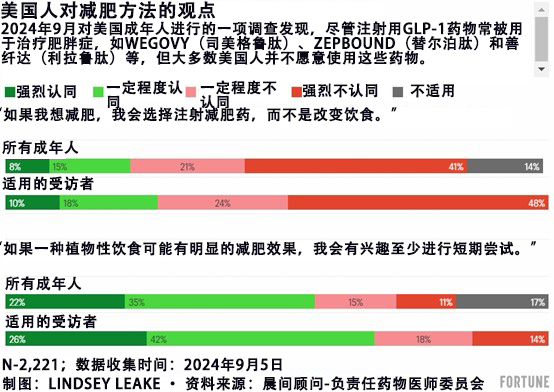
胰高血糖素樣肽-1(GLP-1)激動劑藥物似乎無處不在。最近幾年,這類用于減肥和治療2型糖尿病的藥物,不僅變得家喻戶曉,而且似乎人人都離不開它。供應短缺的新聞占據了媒體頭條,到處都是單調的商業廣告。GLP-1甚至顛覆了食品、服裝和減肥行業。
但一項最新調查發現,盡管注射用GLP-1藥物常被用于治療肥胖癥,如Wegovy(司美格魯肽)、Zepbound(替爾泊肽)和善纖達(Saxenda)(利拉魯肽)等,但大多數美國人并不愿意使用這些藥物。
非營利組織負責任藥物醫師委員會(Physicians Committee for Responsible Medicine,PCRM)與商業情報公司晨間顧問(Morning Consult)合作,調查了2,200多名美國成年人對減肥方法的看法。調查在9月份進行,調查結果于10月8日發布。
受訪者被要求對下面這句話的認同程度進行評分:“如果我想減肥,我會選擇注射減肥藥,而不是改變飲食。”超過一半(62%)的受訪者不認同這種說法,有14%的受訪者表示,這種說法不適用,因為他們不需要減肥。近四分之三(73%)的適用受訪者不認同這種說法。
在有意減肥的受訪者中,不認同這種說法最強烈的群體分別是:
? 男性:75%
? 嬰兒潮一代:78%
? 亞裔或“其他”:77%
? 研究生學位持有者:79%
? 家庭收入超過10萬美元:78%
? 城市居民:75%
? 東北部地區居民:77%
? 登記選民:73%
? 獨立選民:74%
負責任藥物醫師委員會主席尼爾·巴納德博士在關于這項調查的新聞稿中表示:“最新調查結果并不意味著美國人不想減肥。相反,大多數人更傾向于通過改變飲食習慣來減肥,而不是注射藥物。”

雖然調查結果反映了公眾輿論,但這個問題并沒有體現出健康減肥的細微差別。雖然“熱量赤字”是減肥的關鍵,但它終究只是整個拼圖的一部分而已。基因、睡眠、壓力、激素、體育活動和某些藥物都會影響體重管理。個人病史也會產生影響。此外,雖然GLP-1被批準用于治療肥胖癥,但它適用于通過其他方式減肥存在困難的患者,而且應該結合飲食和體育鍛煉使用。
舊金山加州太平洋醫療中心(California Pacific Medical Center)器官移植科肥胖藥物與代謝健康項目醫學主任妮莎·帕特爾博士正在努力推翻一種錯誤觀念,即服用減肥藥是一種輕松的解決方法。
帕特爾之前曾對《財富》雜志表示:“人們忘了,有一些強大的神經激素因素在起作用,這不僅使減肥變得困難,還使得長期保持體重更加困難。服用藥物確實有助于維持平衡。它可以幫助阻斷一些干擾性信號。”
盡管如此,使用GLP-1藥物的依從性是個問題。8月份的《管理式護理與專業藥學雜志》(Managed Care and Specialty Pharmacy)發表的一篇研究簡報顯示,只有三分之一(32%)的患者在一年后仍能堅持用藥。按預期方式使用藥物的患者比例更低(27%)。
植物性飲食對希望減肥的人很有吸引力
負責任藥物醫師委員會還調查了人們對下面這種說法的認同程度:“如果一種植物性飲食可能有明顯的減肥效果,我會有興趣至少進行短期嘗試。”超過一半(57%)的受訪者認同這種說法,有17%的受訪者表示他們不需要減肥。在希望減肥的受訪者中,超過五分之三(68%)的受訪者認同這種說法。
在有意減肥的受訪者中,認同這種說法最強烈的群體分別是:
? 女性:70%
? Z世代:81%
? 亞裔或“其他”:76%
? 大學和研究生學位持有者(比例相同):69%
? 家庭收入超過10萬美元:70%
? 城市居民:75%
? 東北部地區居民:70%
? 登記選民:69%
? 民主黨人:76%

(財富中文網)
胰高血糖素樣肽-1(GLP-1)激動劑藥物似乎無處不在。最近幾年,這類用于減肥和治療2型糖尿病的藥物,不僅變得家喻戶曉,而且似乎人人都離不開它。供應短缺的新聞占據了媒體頭條,到處都是單調的商業廣告。GLP-1甚至顛覆了食品、服裝和減肥行業。
但一項最新調查發現,盡管注射用GLP-1藥物常被用于治療肥胖癥,如Wegovy(司美格魯肽)、Zepbound(替爾泊肽)和善纖達(Saxenda)(利拉魯肽)等,但大多數美國人并不愿意使用這些藥物。
非營利組織負責任藥物醫師委員會(Physicians Committee for Responsible Medicine,PCRM)與商業情報公司晨間顧問(Morning Consult)合作,調查了2,200多名美國成年人對減肥方法的看法。調查在9月份進行,調查結果于10月8日發布。
受訪者被要求對下面這句話的認同程度進行評分:“如果我想減肥,我會選擇注射減肥藥,而不是改變飲食。”超過一半(62%)的受訪者不認同這種說法,有14%的受訪者表示,這種說法不適用,因為他們不需要減肥。近四分之三(73%)的適用受訪者不認同這種說法。
在有意減肥的受訪者中,不認同這種說法最強烈的群體分別是:
? 男性:75%
? 嬰兒潮一代:78%
? 亞裔或“其他”:77%
? 研究生學位持有者:79%
? 家庭收入超過10萬美元:78%
? 城市居民:75%
? 東北部地區居民:77%
? 登記選民:73%
? 獨立選民:74%
負責任藥物醫師委員會主席尼爾·巴納德博士在關于這項調查的新聞稿中表示:“最新調查結果并不意味著美國人不想減肥。相反,大多數人更傾向于通過改變飲食習慣來減肥,而不是注射藥物。”
雖然調查結果反映了公眾輿論,但這個問題并沒有體現出健康減肥的細微差別。雖然“熱量赤字”是減肥的關鍵,但它終究只是整個拼圖的一部分而已。基因、睡眠、壓力、激素、體育活動和某些藥物都會影響體重管理。個人病史也會產生影響。此外,雖然GLP-1被批準用于治療肥胖癥,但它適用于通過其他方式減肥存在困難的患者,而且應該結合飲食和體育鍛煉使用。
舊金山加州太平洋醫療中心(California Pacific Medical Center)器官移植科肥胖藥物與代謝健康項目醫學主任妮莎·帕特爾博士正在努力推翻一種錯誤觀念,即服用減肥藥是一種輕松的解決方法。
帕特爾之前曾對《財富》雜志表示:“人們忘了,有一些強大的神經激素因素在起作用,這不僅使減肥變得困難,還使得長期保持體重更加困難。服用藥物確實有助于維持平衡。它可以幫助阻斷一些干擾性信號。”
盡管如此,使用GLP-1藥物的依從性是個問題。8月份的《管理式護理與專業藥學雜志》(Managed Care and Specialty Pharmacy)發表的一篇研究簡報顯示,只有三分之一(32%)的患者在一年后仍能堅持用藥。按預期方式使用藥物的患者比例更低(27%)。
植物性飲食對希望減肥的人很有吸引力
負責任藥物醫師委員會還調查了人們對下面這種說法的認同程度:“如果一種植物性飲食可能有明顯的減肥效果,我會有興趣至少進行短期嘗試。”超過一半(57%)的受訪者認同這種說法,有17%的受訪者表示他們不需要減肥。在希望減肥的受訪者中,超過五分之三(68%)的受訪者認同這種說法。
在有意減肥的受訪者中,認同這種說法最強烈的群體分別是:
? 女性:70%
? Z世代:81%
? 亞裔或“其他”:76%
? 大學和研究生學位持有者(比例相同):69%
? 家庭收入超過10萬美元:70%
? 城市居民:75%
? 東北部地區居民:70%
? 登記選民:69%
? 民主黨人:76%
(財富中文網)
GLP-1s, or glucagon-like peptide-1 agonist drugs, are seemingly everywhere. In recent years, this class of weight-loss and Type 2 diabetes medication has become not only a household name but inescapable. Shortages have dominated news headlines, and singsong commercials have taken over airwaves. GLP-1s have gone so far as to disrupt the food, clothing, and, of course, weight-loss industries.
Yet despite the ubiquitousness of injectable drugs indicated for people with obesity—such as Wegovy (semaglutide), Zepbound (tirzepatide), and Saxenda (liraglutide)—most Americans wouldn’t take them, according to a new survey.
The nonprofit Physicians Committee for Responsible Medicine teamed up with business intelligence firm Morning Consult to survey more than 2,200 U.S. adults about weight-loss methods. Results of the poll, conducted in September, were released Oct. 8.
People were asked to rate their level of agreement with this statement: “If I wanted to lose weight, I would rather take an injectable weight-loss drug, rather than make a diet change.” More than half (62%) disagreed, with 14% reporting the statement didn’t apply to them because they don’t need to lose weight. Nearly three-fourths (73%) of applicable respondents disagreed.
Among people who were interested in weight loss, these groups most strongly disagreed:
? Men: 75%
? Baby boomers: 78%
? Asian or “other”: 77%
? Postgraduate-degree holders: 79%
? Household income exceeds $100K: 78%
? Urban dwellers: 75%
? Northeasterners: 77%
? Registered voters: 73%
? Independent voters: 74%
“The new findings do not mean that Americans do not want to lose weight,” PCRM president Dr. Neal Barnard said in a news release about the survey. “Rather, most would prefer to change their eating habits than inject a medication.”
While the results offer a snapshot of public opinion, the question doesn’t capture the nuances of healthy weight loss. A calorie deficit is a critical component of weight loss but ultimately just one piece of the puzzle. Genes, sleep, stress, hormones, physical activity, and certain medications can impact weight management. Your medical history also plays a role. What’s more, GLP-1s approved for people with obesity are intended for patients who’ve had difficulty losing weight by other means, and designed to be taken in conjunction with diet and exercise.
Dr. Nisha Patel, medical director of the Obesity Medicine and Metabolic Health Program within the transplant department at California Pacific Medical Center in San Francisco, is working to dispel the myth that taking weight-loss medication is the easy way out.
“People forget that there are some strong neurohormonal factors at play that make it difficult to not only lose weight, but to keep that weight off in the long term,” Patel previously told Fortune. “Medications have really helped level the playing field. It can help interrupt some of that disruptive signaling.”
That said, GLP-1 adherence is an issue. According to a research brief published in the August issue of the Journal of Managed Care and Specialty Pharmacy, roughly one in three (32%) patients were still on their medication after a year. Fewer than that (27%) took the drug as intended.
Plant-based diet appeals to weight-loss hopefuls
The PCRM survey also asked people how much they agreed with this statement: “If a plant-based diet might cause significant weight loss, I would be interested in trying it, at least briefly.” More than half (57%) of all respondents agreed, with 17% saying they didn’t need to lose weight. More than three in five (68%) respondents looking to lose weight agreed.
Among people who were interested in weight loss, these groups most strongly agreed:
? Women: 70%
? Gen Zers: 81%
? Asian or “other”: 76%
? College and postgraduate-degree holders (tie): 69%
? Household income exceeds $100K: 70%
? Urban dwellers: 75%
? Northeasterners: 70%
? Registered voters: 69%
? Democrats: 76%






